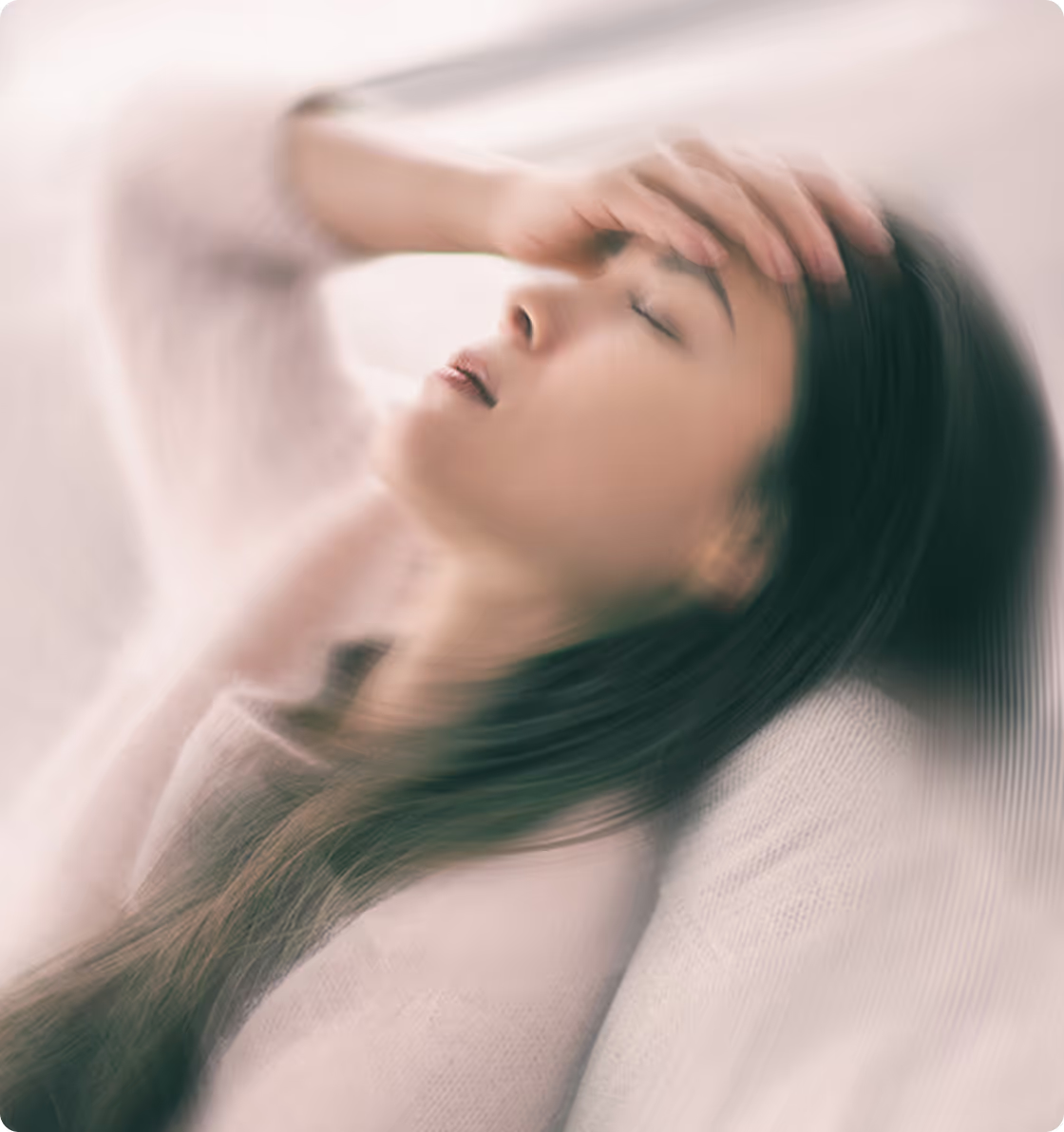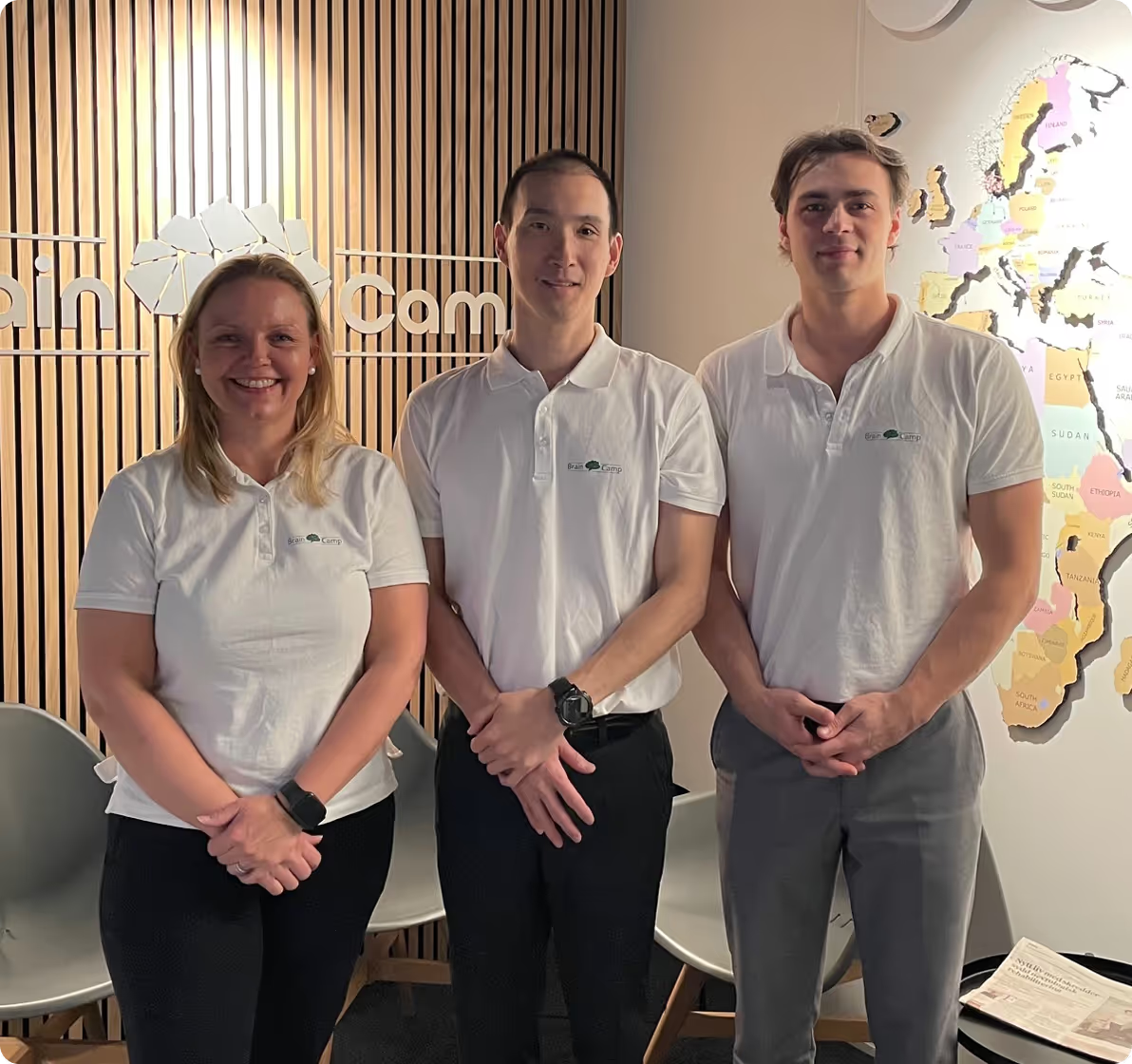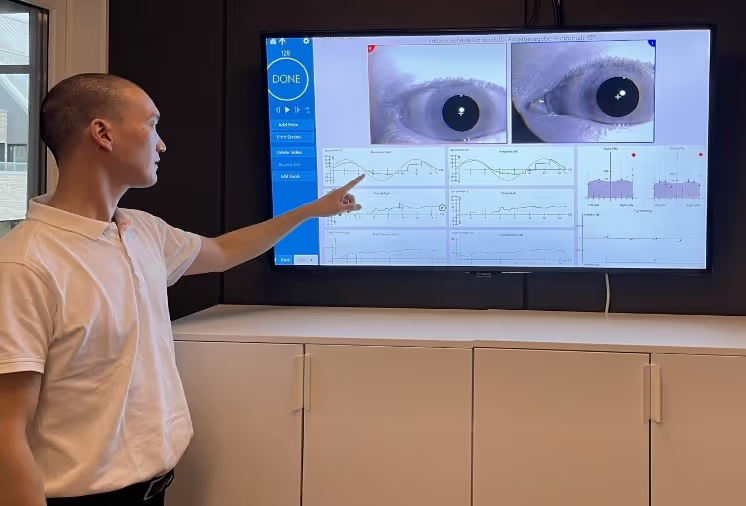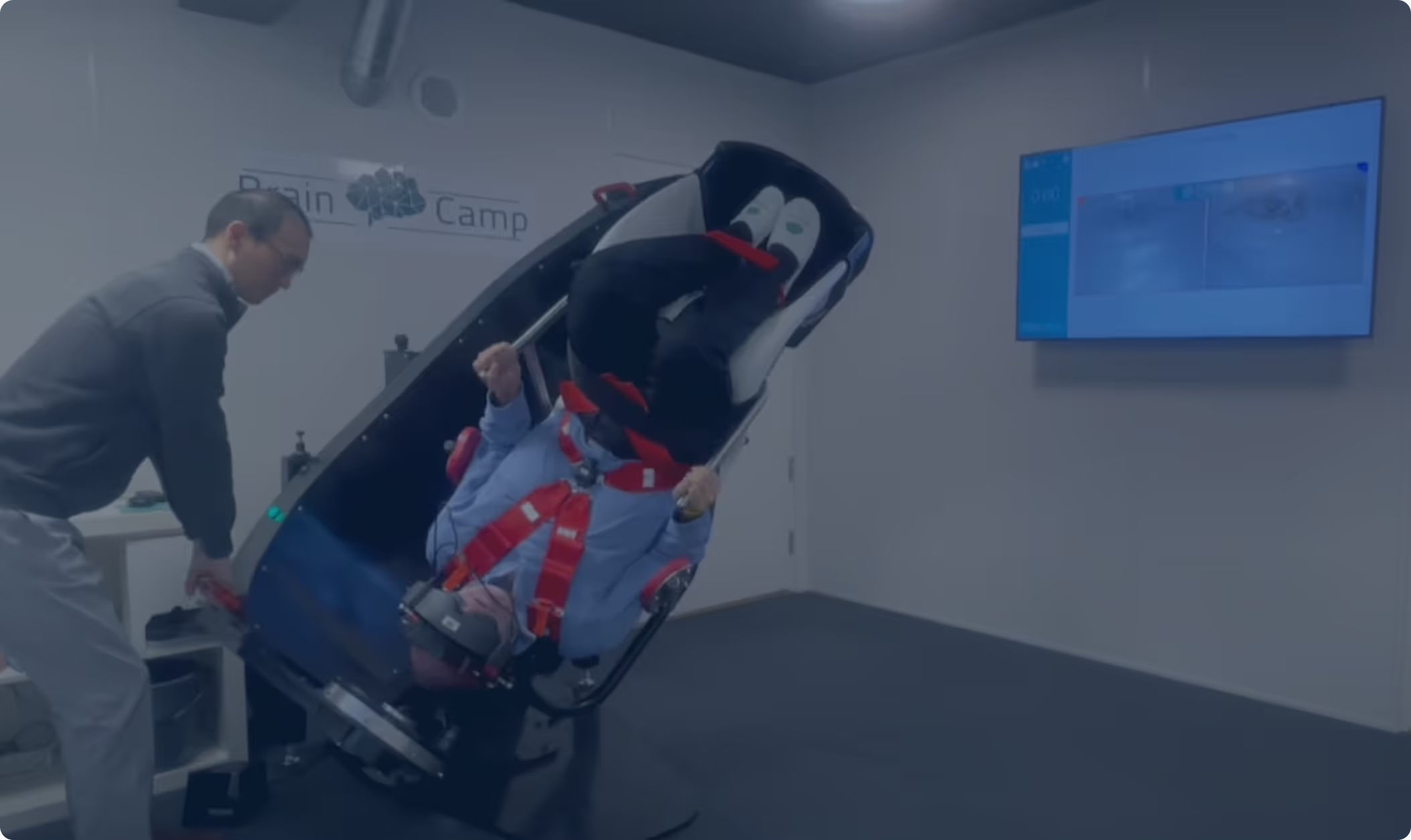We treat dizziness and balance problems
We offer you a thorough examination, modern technology and individually tailored treatment for lasting recovery.


Contact us
Fill out the contact form or contact us directly by email.
Or call us at:
Visiting address:
Brain Camp
Vestre Strandgate 42
5th floor
4612 Kristiansand
Norway
Do you suffer from dizziness or balance problems?


"I came to Kim Tore Johansen with unpleasant dizziness. I have been treated 5 times and am practically completely healthy again . I have not been away from work and after the first time the discomfort was much less."
How we help you
We offer comprehensive and thorough evaluation of dizziness and balance disorders.
A comprehensive and thorough assessment is carried out to map and understand your condition and what treatment you need.
After 2-3 treatment sessions, re-testing is performed using data-driven tests to evaluate progress.
When re-testing shows improvement, you will receive thorough training on how to do the exercises yourself for a period of time. This includes written and video instructions on how to perform the exercises correctly.
We will follow you closely during the period of exercises at home before you return for a new re-test to assess whether you are ready for the next phase of rehabilitation.
What makes us unique?
Common dizziness conditions we treat
Comprehensive and thorough investigation
Traumatic head injury
Head injuries, including concussions, can cause lasting balance and dizziness problems as a result of damage to the vestibular system, or the brain's ability to process and coordinate different sensory inputs.
In the event of a head trauma, one can get a combination of several of the above-mentioned forms of dizziness. Including BPPV as a result of the head trauma itself, developing vestibular migraine as a stress reaction as a result of the functional disorders in the brain caused by the head trauma, and impaired balance and coordination as a result of the head trauma. It is therefore essential to have a comprehensive and thorough functional examination to map which parts of the brain and nervous system need training.
Vestibular Migraine
Vestibular migraine is one of the most common causes of recurrent attacks of dizziness, often accompanied by headache, hypersensitivity to sound and light, nausea, and fatigue.
Migraine attacks cause temporary or long-term functional disorders in several areas of the brain that involve, among other things, balance, coordination, orientation, sensory perception, and pain simultaneously. Our comprehensive neurological examination maps the functional disorders of the brain and nervous system and gives us a good foundation for how the tailored neurological rehabilitation should be put together. The goal of tailored neurological rehabilitation is to improve tolerance to sensory impressions and activity before migraine attacks are triggered, and reduce the frequency, intensity and duration of migraine attacks.
Mal de Débarquement syndrome (MdDs) (Disembarkation syndrome)
MdD is a dizziness syndrome that is also caused by functional disorders in the brain's ability to coordinate and process sensory input.
This is a rarer form of dizziness, but the dizziness and accompanying symptoms can be experienced as very similar to those of PPPD. But there is one thing in particular that distinguishes MdDs from PPPD and other forms of chronic dizziness. The dizziness of MdDs temporarily disappears or is significantly reduced in intensity when, for example, driving a car. But returns again immediately the car stops, and is then often more intense than before the actual drive began. Through tailored neurological rehabilitation and more frequent evaluations with advanced computer-based equipment, we can reduce dizziness and improve tolerance to both sensory impressions and activity.
Persistent Postural-Perceptual Dizziness (PPPD)
This chronic condition is often triggered by acute vestibular events such as BPPV, vestibular neuritis, or migraine.
PPPD is caused by dysfunction in the brain's ability to coordinate and process different sensory inputs simultaneously. Patients experience persistent dizziness and a number of other symptoms that are triggered or worsened by activity and exposure to sensory inputs. Especially visual inputs. Our approach with the help of advanced examination equipment and tailored neurological rehabilitation can teach the brain to coordinate and process sensory inputs in a better way so that dizziness and accompanying symptoms are improved.
Vestibular Neuritis (Virus on the balance nerve)
Inflammation of the vestibular nerve is the most common form of dizziness and causes acute, intense dizziness similar to BPPV. However, this dizziness lasts longer.
You may experience a constant feeling of dizziness that lasts for hours, days or weeks. And is worsened by any movement of the head. Including getting up from a lying down to a sitting position and other changes in head position such as in BPPV, walking and making sudden movements of the head. Although many experience improvement within a few weeks, as many as 30% experience long-term problems with dizziness. Our treatment focuses on restoring balance functions through rehabilitation and adapted exercises.
BPPV (Positional dizziness)
BPPV is the most common cause of dizziness and affects over 10% of the population during their lifetime.
The condition occurs when small particles in the inner ear become loose and cause attacks of intense dizziness, usually lasting 5-10 seconds at a time. BPPV dizziness is triggered by head movements. such as when you lie down and turn in bed, get up from a lying position to a sitting position, bend forward to pick something up, or tilt your head back to look for something. We offer precise examination with video oculography and treatment with a TRV chair, which provides effective results and reduces the risk of recurrence.
Our therapists
Leading in dizziness, balance disorders and neurological rehabilitation.

Frequently asked questions about treating dizziness and balance problems
BPPV (Positive Vertigo)
The first examination lasts approximately 1 hour:
-2370 NOK/205 EUR
Treatment of BPPV in TRV Chair: -1930 NOK/167 EUR
Chronic dizziness, neurological disease, whiplash and traumatic head injury
The first examination lasts approximately 5 hours:
-4970 NOK/430 EUR
Treatment/neurological rehabilitation:
-From 1425 NOK/123 EUR
Re-test/Re-evaluation:
-From 2925 NOK/253 EUR
5 day rehabilitation stay
-From 40,000 NOK/3,455 EUR (travel and accommodation are additional)
Monday morning we start with a thorough examination to map out the functional disorders of the nervous system and brain, followed by a thorough review of what your examination shows. Including a review of findings from the computer-based tests that show how the brain and nervous system function.
If you are accompanied by a close relative, we always recommend that the relative joins us when we review the findings. Relatives find this very useful in gaining a better understanding of your health situation. If you are not accompanied by a close relative, but your close relative is still interested in having your findings reviewed, the relative can join you via video call. You will then have a 1 ½ hour break before we start your first treatment, which lasts 30-40 minutes.
Your treatment will continue on Tuesday morning followed by the first re-test which includes, among other things, the various computer-based tests to confirm whether the brain and nervous system are responding as expected. In many cases, it is seen that the brain and nervous system are incorrectly compensating, and several tests become worse. Then we have to change and fine-tune the treatment program and then re-test again after 2-3 treatments on the same day or the next day. These re-tests are the key to being able to tailor your neurological rehabilitation. This process continues throughout the week until we have identified the most effective treatment program that affects your brain and nervous system in the best possible way, and gives you the best possible potential to improve symptoms and quality of life.
On Friday, we dedicate 3 sessions to teaching you how to perform the tailored home exercises on your own. If you need help performing the exercises, your travel companion will also receive thorough training on how to perform the exercises. This includes both written instructions and video instructions on how to perform the home exercises 3-5 days a week, with 1-2 sessions per day lasting anywhere from 5 minutes to 30 minutes.
Friday ends with a new re-test and re-evaluation to get a final evaluation of how the home exercises affect the brain and nervous system. We then have a good foundation to create a customized rehabilitation plan for the next 3-5 months before you should come back for a new rehabilitation stay. This is not the last day of treatment, but the start of a customized rehabilitation plan and close cooperation.
Includes close follow-up via email or phone during the first few weeks to ensure the best possible effect. There may then be a period of 8-10 months between the second and third rehabilitation stays. Learn more about rehabilitation stays
For those who have the opportunity, we recommend that your closest relatives join you when we review your findings. Relatives find this very helpful in gaining a better understanding of your health situation.
We then create a tailored rehabilitation plan for the first 3 treatments lasting 30-40 minutes per session, followed by a re-test/re-evaluation immediately after the third treatment.
Re-testing includes, among other things, the various computer-based tests to confirm whether your brain and nervous system are responding as expected. In many cases, it is seen that the brain and nervous system incorrectly compensate, and several tests become worse. Then we have to change and fine-tune the treatment and exercises and then re-test again after 2-3 treatments.
When re-tests show satisfactory changes, we create customized home exercises based on the treatment plan that best improves your tests.
The home exercises are performed 3-5 days a week, with 1-2 sessions per day lasting anywhere from 5 minutes to 30 minutes.
The patient works on the exercises themselves for 4-6 weeks before we re-test/re-evaluate to see if we can upgrade the rehabilitation plan.
However, the plan often needs to be further fine-tuned when you return home and start your home exercises in combination with your regular everyday activities. We will then closely monitor your progress by changing the amount and intensity of your home exercises, as well as adjusting your general activity level over the course of a day and week.
In most cases, following up via email is sufficient, but in some cases we need to arrange a telephone or video consultation to get enough information to further tailor the rehabilitation plan. Even if you go home and work on exercises on your own, you are not alone. We will follow you closely.
Contact us
Fill out the contact form or contact us directly by email.
Or call us at:
Visiting address:
Brain Camp
Vestre Strandgate 42
5th floor
4612 Kristiansand
Norway
Sign up for our newsletter
Check the information you are interested in so that we can send you customized information and news.



